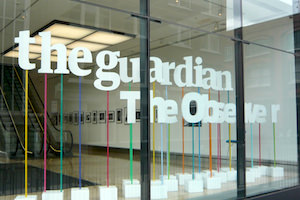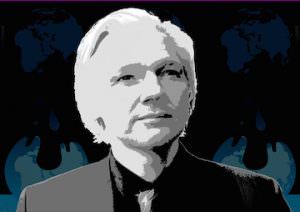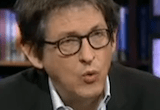Truthdiggers of the Week: Editors and Reporters of The Guardian
In an age of unprecedented antagonism toward the press, one newspaper headquartered in the heart of a former empire is making a spirited thrashing of the image and ambitions of some of the world's proudest elites.One newspaper headquartered in the heart of a former empire is making a spirited thrashing of the image and ambitions of some of the world's proudest elites.
Every week the Truthdig editorial staff selects a Truthdigger of the Week, a group or person worthy of recognition for speaking truth to power, breaking the story or blowing the whistle. It is not a lifetime achievement award. Rather, we’re looking for newsmakers whose actions in a given week are worth celebrating. Nominate our next Truthdigger here.
Since 2009, investigations by The Guardian have sent shock waves through the halls of power across the world. Like others devoted to the principles of their profession, I suspect its editors and reporters would demur at the suggestion that they’re engaged in anything more than journalism. In a strictly technical sense, they’d be right. But no action is deliberately taken without some expectation of consequence, and the thoughtful efforts of Guardian staff, operating in Britain, the United States and now Australia, have had history-determining effects that are decidedly not apolitical.
Three of the paper’s major investigations were profiled by media critic Ken Auletta in the Oct. 7 issue of The New Yorker. The first, from 2009, consisted of a “torrent of stories revealing how Rupert Murdoch’s British tabloids had bribed the police and hacked into the phones of celebrities, politicians, and the Royal Family.” The second came in 2010, when the paper “published a trove of WikiLeaks documents that disclosed confidential conversations among diplomats of the United States, Britain and other governments, and exposed atrocities that were committed in Iraq and Afghanistan.” The third, some of which was co-authored with The Washington Post, was journalism’s blockbuster event of the summer, beginning with the publication of “top-secret digital files provided by Edward Snowden, a former contract employee of the National Security Agency.” The files demonstrated unequivocally, for the first time, that “the N.S.A., in the name of combatting terrorism, had monitored millions of phone calls and emails as well as the private deliberations of allied governments.” Subsequent reports showed the intrusion into people’s private lives extended to nearly every kind of online activity and involved the cooperation of major technology companies, that the British intelligence agency, GCHQ, engaged in similar spying, and that the two organizations shared data.
The impact of the NSA revelations so far has been to force governments and businesses into a stilted conversation with journalists, scholars and civil society about the proper limits on their power to monitor people. The U.S. government’s response was predictable: Surveillance is an essential tool, abuses are limited or prevented by adequate oversight, and the release of Snowden’s documents jeopardized national security and the lives of officials and service members. In short: Trust us. This stuff is complicated. We’re the only ones who understand what we’re doing, and it’s in the public’s best interest to keep it that way. All unauthorized parties in possession of the files were ordered to return them immediately. The British government responded similarly.
Many who value liberty and democracy disagreed. As Auletta reports, Guardian editor Alan Rusbridger, who has led the paper since 1995, told British officials who attempted to dissuade him from publishing the reports “that the files contained information that citizens in a democracy deserved to know, and he assured [Cabinet Secretary Jeremy] Heywood that he has scrubbed the documents so that no undercover officials were identified or put at risk.” The possibility that the paper would be prevented from publishing the investigations was real. “Unlike the U.S., Britain has no First Amendment to guard the press against government censorship. Rusbridger worried that the government would get a court injunction to block the Guardian from publishing not only the G.C.H.Q. story, but also future national security stories.”
Fortunately that didn’t happen. But Rusbridger and his colleagues have not worked free of fear. One misstep — unwittingly publishing the name of an undercover agent, for example — and the British and American governments could, in the eyes of much of the public, justifiably depict the entire investigation as irresponsible, illegitimate and dangerous. Legal expertise and sophisticated measures of caution were needed to avoid interference. For certain reports, Rusbridger partnered with American news organizations, which allowed for the sharing of both investigative and legal resources. He also had the benefit of working out of The Guardian’s U.S. office, a loft in Manhattan’s SoHo neighborhood that opened in 2011 as the Occupy Wall Street protests kicked off. The London office got a security overhaul. Floor-to-ceiling windows in a room known as “the bunker” were covered with white blinds; smartphones and other personal electronic devices that could be remotely transformed into microphones were kept outside; five new laptops on which staff worked remained unconnected to the Internet and allowed access to Snowden’s encrypted files only upon the entry of three passwords, with no individual knowing more than one. The paper’s serious treatment of the matter, now well documented and widely reported, could not be credibly maligned.
Nor, hardly, could Rusbridger’s basic sense of why the conversation is important. “I think what we are saying is that there has to be a wider debate because it’s not just about national security,” he told “Democracy Now!” in September. “There are other interests in society; privacy, civil liberties, of reporting which had to be weighed against security.” The British government didn’t see it that way. Intelligence officials eventually ordered Rusbridger and his colleagues to destroy, in front of a couple of their own spooks, the laptops they used for their stories. The editor called the event “the most bizarre thing that I think has happened in my journalistic career.” He carries part of one of the destroyed circuit boards with him as a “memento … a rather sinister reminder of the intersection of states and journalism.”
The Guardian owes its values and form more to Rusbridger than perhaps anyone else. As the paper has no owner, no publisher appointed him chief editor. He joined the group as a general reporter in 1979, a few years after college, and was promoted up the ladder over the next two and a half decades. In the mid-’90s his peers voted him chief after reading manifestos all applicants were required to submit, in which they stated their vision for the paper’s future. Rusbridger’s, Auletta writes, “expressed his desire to change the image of the Guardian as a left-wing newsaper. ‘I tried to make sure the reporting was straight,’ he told me, while weeding out the ‘mix of reporting and opinion,’ and the habit of ‘telling people what to think.’ The editorial page would no longer automatically support the Labour party.” Auletta quotes Rusbridger’s friend Henry Porter, who writes a column for The Observer, a Sunday edition of The Guardian, as saying, “His basic stance is skepticism.” His brother-in-law, David Leigh, the paper’s former executive investigations editor, describes him as “genuinely moderate. From an American point of view, he is very left. From a British point of view, he is not.” Rusbridger also changed the paper’s physical format, and began an ongoing push for a strong, responsive online presence after a trip to the Silicon Valley in 1994. He describes the paper’s future as “open journalism,” in which free access is provided to readers who are also invited to participate as part of a community of newsmakers. Under this model, a newspaper becomes “a platform as well as a publisher,” Rusbridger told Auletta. All some readers will need to know about Rusbridger is that he credits his decision to become a journalist to the experience of reading all four volumes of George Orwell’s collected writings at age 15.Of course, an editor doesn’t run a paper on his or her own. The Guardian has and continues to employ many editors and reporters of proven merit, not all of which come from within the profession. Rusbridger describes The Guardian’s present form as a union between “the old world and the new world … the fourth estate, newspapers” and “the fifth estate, bloggers.” He supported the hiring of Glenn Greenwald, a pugnacious civil rights lawyer who in recent years has become an international authority on the subjects of national security, surveillance and privacy, first through his personal blog, then through Salon.com, and now at The Guardian. He worked with and openly praises the mission of WikiLeaks founder Julian Assange, a figure whom many, if not most high profile editors would not touch without feeling great fear for their reputations. “Data” investigator James Ball was hired from WikiLeaks, in part for his deep knowledge of computers. At 27 years old, he exemplifies Rusbridger’s interest in hiring young people. Nick Davies, who is 60, led reporting on the Murdoch and WikiLeaks stories, and along with Leigh and Ewen MacAskill — who supervised Greenwald and documentary filmmaker Laura Poitras during their meeting with Snowden — had the experience Rusbridger and others needed to publish the NSA investigations with confidence. U.S. Editor-in-Chief Janine Gibson directs the paper’s New York office and works closely with Greenwald as the staff continues to fill in the blanks on government spying. Fifty-five people work in the American office, half of whom are journalists. The paper employs 1,600 people worldwide.
Impressively, and unlike the staff at many traditional U.S. newspapers, many Guardian associates do not pretend to have no opinions about the stories they cover. Auletta writes that the paper appealed to Davies, who joined it the same year as Rusbridger, because it is not driven by profits and has a “moral agenda. … Over and over again, the Guardian has been on what I would call the right side of the moral barricades in key moments.” He insists the paper’s liberal bias directs “the subjects we cover,” not the reporting. “A moral agenda is not an excuse for distorting information to score points,” he says.
The free manner in which Davies claims a clear moral direction prompts the question: How can a prominent paper doing political reporting openly espouse a moral agenda? The answer begins by recognizing that The Guardian is still at heart a British publication, born of a society where journalists have traditionally not been held to the same strict standards of objectivity that American reporters are required in a particular form to observe. But tradition alone would not be enough to sustain this privilege. The deeper answer lies in the fact that the paper is financially independent. Nearly 80 years ago, the son of former longtime editor C.P. Scott set aside money and established the Scott Trust in order “to secure the financial and editorial independence of the Guardian in perpetuity: as a quality national newspaper without party affiliation; remaining faithful to the liberal tradition.” If the paper sells enough subscriptions and ads to avoid depleting the trust, its survival is assured, as long as the investments on which the trust depends hold out. But print subscriptions have long been declining, and ad income is not yet enough. The Guardian has lost money for nine straight years. “Last year,” Auletta writes, “the director of the trust and the C.E.O. of the Guardian Media Group, warned that the trust’s money would be exhausted in three to five years if the losses were not dramatically reduced.” If the paper does not begin to make money, the trust’s liquid assets, currently valued at $405 million, will be depleted, and its brand of probing journalism in jeopardy.
Naturally, the Guardian’s directors are looking to expand. Tony Danker, the paper’s international director, says his job is “to think, What’s next internationally?” He and his co-workers are “actively looking” in “five or six places,” including India, which has a frail Internet infrastructure but a large English-speaking population. Auletta summarizes The Guardian’s “grand,” ongoing “experiment” in expansion in eight words: “just how free can a free press be?” In other words, how fast can the paper grow and evolve while maintaining its unique standards?
There is no question that a global Guardian conducting investigations guided by the values Rusbridger and his colleagues have added and preserved would work to society’s immediate benefit. In an interview with The New York Times, Edward Snowden said he did not take his revelations to that paper because, “After 9/11, many of the most important news outlets in America abdicated their role as a check to power — the journalistic responsibility to challenge the excesses of government — for fear of being seen as unpatriotic and punished in the market during a period of heightened nationalism.” In contrast, Guardian-associated Laura Poitras and Glenn Greenwald “were among the few who reported fearlessly on controversial topics throughout this period, even in the face of withering personal criticism.”
This reputation for fearlessness, combined with free, readable articles hosted on a sleek, easily navigated website, all contribute to The Guardian’s appeal, especially among younger people who implicitly distrust anything that looks like establishment power, and others who are fortunate enough to know better. The numbers suggest the strategy is working. The paper’s readership has tripled since 2009, and two-thirds of its readers now live outside the U.K., with one-third living inside the U.S. Daily traffic topped 7 million visitors after one NSA story was published over the summer. “With eighty-four million monthly visitors, according to the Audit Bureau of Circulations,” Auletta writes, “the Guardian Web site is now the third most popular English-language newspaper Web site in the world.” First place belongs to The New York Times. Second goes to London’s Daily Mail, “with its celebrity gossip and abundant cleavage.” That makes the Guardian the second most read English-language paper for information.
May its directors continue to steer it to the front of public perception. In The Guardian, we have a picture of a more honest journalism, unimpressed by official intimidation and undistorted by the need to make money in an economy that has proven incapable of supporting aggressive reporting. When its staffers do their jobs, they make other major papers like The New York Times and The Washington Post — both of which have their moments of greatness — look bad for failing to do theirs. The differences are becoming harder to miss. If The Guardian keeps scooping everyone else, its reputation and audience will continue to swell, and other papers will feel pressured to respond by adjusting their priorities accordingly.
There remain many whistles for conscience-driven people like Edward Snowden and Chelsea Manning to blow. We’re only too fortunate that Rusbridger and his staff are eager and willing to work with them. The future of journalism and public information may be largely in their hands. For making a consistently thrilling, principled and constructive mess of the image and ambitions of some of the world’s proudest, most malicious elites, we honor everyone at The Guardian as our Truthdiggers of the Week.
Hear Rusbridger talk about the Snowden story as it developed below.
‘Democracy Now!’:
Your support matters…Independent journalism is under threat and overshadowed by heavily funded mainstream media.
You can help level the playing field. Become a member.
Your tax-deductible contribution keeps us digging beneath the headlines to give you thought-provoking, investigative reporting and analysis that unearths what's really happening- without compromise.
Give today to support our courageous, independent journalists.






You need to be a supporter to comment.
There are currently no responses to this article.
Be the first to respond.